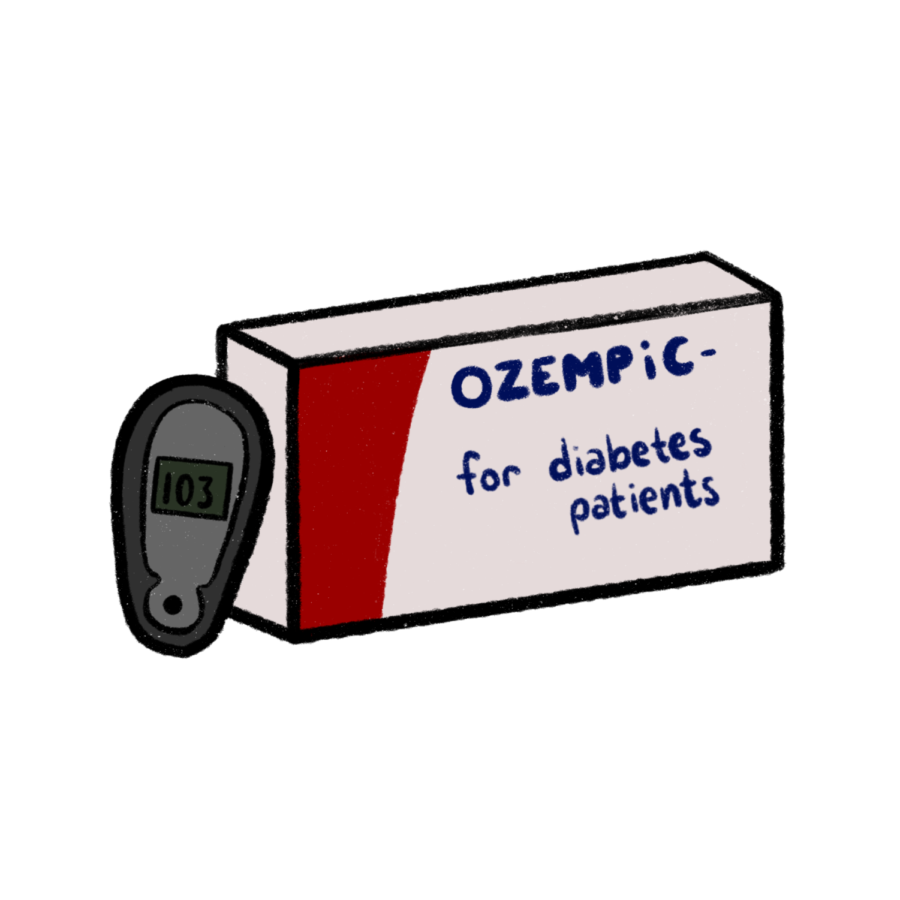Ozempic obsession: Tiktok needs to stop toxic dieting
Ozempic is a medicine that should be reserved for type 2 diabetes patients rather than people looking to diet and lose weight.
April 19, 2023
“Diet TikTok” has gained a newfound obsession with Ozempic, a drug intended to be used by the 462 million individuals living with type 2 diabetes. These Tiktok dieters have touted the diabetes medication for its off-label use as a weight-loss drug, and videos under hashtag “Ozempic” and “Ozempic weight-loss” within the platform have garnered hundreds of millions of views. With this sudden uptick in interest surrounding Ozempic, prescriptions and purchases of the drug have soared, while supply has continued to dwindle. In the process, the Ozempic craze has left many type 2 diabetic patients unable to access the medication they need, even though the American Diabetes Association has asked for them to be prioritized. It is entirely irresponsible and negligent for ‘influencers’ with no medical background to market medicine to millions of people at the expense of those who actually need it to survive.
In the countless TikToks displaying the results users have gotten through Ozempic, this medication is described as a “miracle drug,” an easy and effective way to lose weight. Many of those documenting their “Ozempic journeys” rely solely on the medication in order to lose weight, and neglect enactment of beneficial lifestyle changes. “Typically people think, ‘Oh, if I just took this one drug, you know, I can lose weight,’” said Freshman Kimberly Lee. However, weight-loss through Ozempic is not that simple. As stated in an article from Forbes, those who use Ozempic as their sole method of weight loss typically gain the weight back almost immediately after they stop taking the drug. Thus, people that abuse the drug do not gain anything after using it.
In accordance with its intended use as a drug to help regulate blood sugar levels in people with type 2 diabetes, Ozempic decreases one’s appetite, thereby causing weight-loss. This means that without major lifestyle changes alongside usage of the medication, in order to maintain the weight that an individual loses, it must be used indefinitely, as food cravings return after the drug is no longer used. This unsustainable over-reliance on Ozempic that so many have readily embraced has caused massive shortages, leaving those suffering from type 2 diabetes at risk.
Even more, diabetes medication is commonly associated with health complications, especially when used by those without diabetes. According to an article from Time Magazine, common side effects of Ozempic include nausea, vomiting and abdominal pain. Other potential effects even go as far as thyroid tumors, pancreatitis and gallbladder disease. “I don’t think it’s a healthy option if people just want to look a certain way, and it’s more useful to people who actually need it,” said freshman Jessica Yao.
Medications such as Ozempic have serious, potentially dangerous side effects, and should be used with caution. However, people continue to ignore these side effects in favor of an attempt to conform to unrealistic beauty standards, further solidified by platforms such as TikTok. As Lee put it, “they’ll go through side effects… as long as it guarantees them what they think is ‘beauty.’” It is clear that weight loss through Ozempic does not promote healthier lifestyles. Rather, it perpetuates the prioritization of skinniness and unrealistic beauty standards over a genuine interest in one’s health.
It is important to recognize, however, that obesity is a medical illness, and that there are people who are physically unable to lose weight, no matter how much they change their lives in order to do so. For these patients, weight-loss inducing drugs can and should be prescribed. However, these circumstances clearly do not apply to all users, and for these individuals, Ozempic and other similar medications are not permanent solutions by any means. Rather than promote a world in which people seek the easy way out, social media influencers should focus on helping people embrace healthy lifestyles that will benefit their health in the long run.
The Ozempic obsession highlights a wider issue surrounding beauty standards and the prioritization of skinniness perpetuated on social media. “We know social media has an impact and I feel like people from a young age are exposed to all of these standards. They’re really unhealthy because you’re comparing yourself to other people,” Yao said. People have become so focused on conforming to unrealistic standards that they readily jeopardize their own health and the health of millions of type 2 diabetic patients. Rather than fall for weight loss scams on social media, people need to seek out medical experts and professional advice in order to ensure their safety and health.



